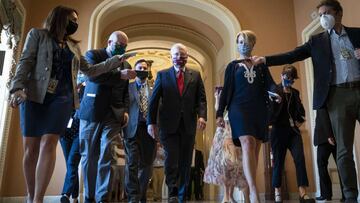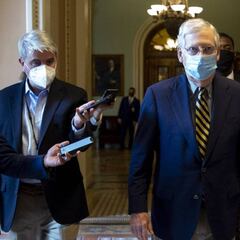Second stimulus check: what other benefits and payments are included in HEALS?
Democrats and Republicans will resume talks Monday over a fresh stimulus package that will address a second round of payments and unemployment benefits.

Talks between Republicans and Democrats over the fine details of a fresh stimulus package are due to resume on Monday with the two parties still “far from” reaching consensus according to House Speaker Nancy Pelosi. A week after the Republicans presented the HEALS Act, a $1 trillion package that was designed in response to the $3 trillion Democrat-led HEROES Act, there is still plenty of ground to make up as the Senate races against the clock to push through a deal before the summer recess on 7 August. On the table are a second round of stimulus checks - which U.S. President Donald Trump has indicated he would like to push "way higher" than the first - unemployment benefits, an extension to the Paycheck Protection Program and financial aid to states and local authorities hit hardest by the economic effects of the ongoing coronavirus pandemic.
- Second stimulus check: What is my AGI and where can I find it?
- Second stimulus check: will it arrive quicker than the first one?
- $1,000 stimulus check: how much money for children and adults?
- Li-Meng Yan: coronavirus was developed in Chinese military lab
Second round of stimulus checks
As both Democrats and Republicans point the finger over a delay to passing the new stimulus package, Americans are being forced to wait to discover the exact make-up of the draft bill. While both parties agree on the need for a second round of stimulus checks and have reached a tentative consensus on the amounts involved, there remains a divide on the matter of dependents. Under both the HEALS and HEROES Act individual adults stand to receive a second check of $1,200 with the eligibility criteria largely unchanged from the first tranche released under the CARES Act.
Related: When can I expect my second stimulus check?
In the March-approved legislation that released $2.2 trillion in Federal funding, stimulus checks worth $1,200 were sent to individuals who earn less than $75,000 a year, while joint tax filers on under $150,000 received $2,400. Checks for a steadily smaller amount were made available to higher earners, up to a final income cap of $99,000 for individuals and $198,000 for joint filers. That is expected to be the case again in the final draft.
However, the payment of additional credits for dependents is an aspect where the CARES Act and the HEALS Act differ.
The HEALS Act offers households an extra $500 per dependent, as was also the case in the CARES Act. However, it seeks to include millions more dependents by broadening eligibility for this extra credit: whereas CARES limited the additional $500 to dependents under 17, HEALS covers dependents of all ages.
According to the Tax Foundation, a non-profit organization that focuses on fiscal policy in the States, the removal of the CARES Act age limit on dependents would make as many as 26 million more people eligible for the credit.
There is no mention in either the CARES Act or the HEALS Act of a maximum number of dependents for which the $500 credit can be claimed.
The HEALS Act bids to bring more dependents into the fold than the CARES Act, but the proposed amount per dependent is less than the HEROES Act, which seeks to provide $1,200 for dependents of all ages, up to a maximum of three per household.
Unemployment benefits
Americans need to buy food & pay rent. Republicans shouldn’t be quibbling over $600 for workers on unemployment. #FamiliesFirst #DeadlineWH pic.twitter.com/qiuxG71XL7
— Nancy Pelosi (@SpeakerPelosi) July 27, 2020
Under the CARES Act out-of-work Americans have been receiving an additional $600 a week in jobless benefits, as part of the Federal Pandemic Unemployment Compensation (FPUC) scheme. However, this initiative expired on 31 July and remains one of the main sticking points in negotiations.
The Republican proposal seeks to reduce the expanded unemployment benefit from $600 a week to $200 a week, in addition to state unemployment benefits. HEALS allows for the benefits to be extended until 5 October, at which point the bill would land at the feet of state governments who would be obliged to pay unemployed workers about 70% of the income they had before they lost their jobs. This extra payment would be capped at a maximum of $500 a week and would expire at the end of the year.
The Democrats’ proposal under the HEROES act would extend the current $600 weekly payment until January 2021.
Pelosi has accused Republicans of “quibbling” over the $600 weekly payment while White House officials took their own hard line, accusing Democrats of refusing Trump's proposals to extend the jobless benefit and a moratorium on home evictions.
Other areas of funding under HEALS Act
⚡ BREAKING → Senate Republicans just released the HEALS Act.
— Senate Republicans (@SenateGOP) July 27, 2020
This is the conservative plan to *finish the fight* against coronavirus:
✓ Provides tools to reopen responsibly
✓ Tailored relief to Americans who need it most
✓ Surge in resources for testing + vaccine pic.twitter.com/lyldH2QQww
Beyond direct financial aid to US Citizens, the HEALS Act also addresses issues such as the Paycheck Protection Program, funding for schools and small businesses, increased testing and tracing for Covid-19 and state and local government aid. Below is a brief summary of where the Democrats and Republicans stand on these areas.
Liability protection
Republican plan: Includes as one of its core proposals measures to protect businesses and institutions from coronavirus-related lawsuits if they are following government guidelines.
Democratic plan: did not include anything on this and Democratic leaders have pushed back against the idea.
Schools
Republican plan: Includes $70 billion for helping schools to reopen and $30 billion for colleges and universities.
Democratic plan: $100 billion to support the educational needs of states, school districts and institutions of higher education in response to coronavirus.
Testing, contact tracing and treatment
Republican plan: $16 billion for coronavirus testing; $25 billion for hospitals.
Democratic plan: $75 billion for testing, tracing and isolation measures, and to support hospitals and healthcare providers and ensure free access to treatment for individuals.
Paycheck Protection Program
Democratic plan: Gives small businesses more flexibility with how they use loans from this program (previously they were required to use 75% for payroll expenses, or be forced to pay it back as a loan)
Republican plan: Would allow the hardest-hit smallest employers, whose revenue has declined by 50% or more, to get a second forgivable loan under the program. To qualify, businesses must have 300 or fewer employees.
State and local governments
Democratic plan: Nearly $1 trillion in aid to state, local, territorial and tribal governments to help pay first responders, healthcare workers and teachers.
Republican plan: Does not include new money, but Republicans said it would give state and local leaders more flexibility in spending the $150 billion passed into law in March.
See also
Republicans launch HEALS Act in the Senate
Republicans and Democrats divided on Senate HEALS Act
Related stories
"The virus is not of natural origin and did not emerge in Wuhan"
US latest news
Follow all the latest developments related to the coronavirus pandemic in the United States with our daily live blog.

